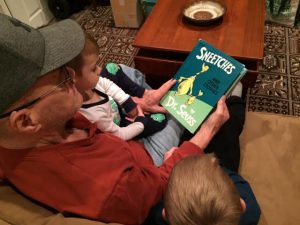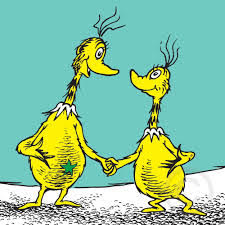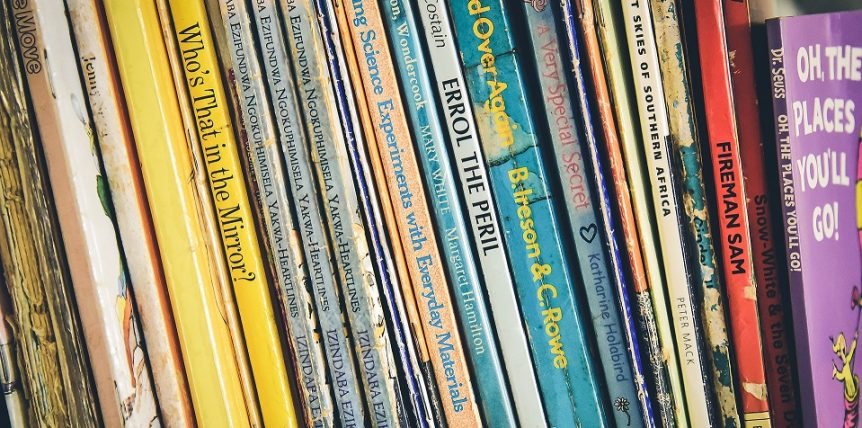Rita and I have been blessed with the world’s two most amazing, inquisitive, and lovable grandsons. I know you’re thinking that every grandparent says that, but I assure you, in our case, it is actually true! They are four and six years young at the present time, but it seems like those numbers are changing all too fast.
One day on a recent visit, they had a familiar request/command: “Popo, read us a book!”
 They each handed me a few of their favorites. The one on top immediately took me back 30-some years to when their father was sitting on my lap with the same “request” and the same book. The Sneetches and Other Stories by Dr. Seuss. Dr. Seuss was always one of my favorite writers because it felt like each story carried a deeper message. The Sneetches was certainly one of those.
They each handed me a few of their favorites. The one on top immediately took me back 30-some years to when their father was sitting on my lap with the same “request” and the same book. The Sneetches and Other Stories by Dr. Seuss. Dr. Seuss was always one of my favorite writers because it felt like each story carried a deeper message. The Sneetches was certainly one of those.
For those of you who haven’t read it for a long time—or have never had the pleasure!—I encourage you to raid your children’s or grandchildren’s bookshelf, borrow it from the library, or buy yourself a copy. The entire text minus the whimsical illustrations can be read HERE.
In the meantime, here’s the gist: The Sneetches are an imaginary breed of creatures, some of whom have stars on their bellies and some who don’t. Those with stars fancy themselves a superior kind of Sneetch and don’t associate with their “lesser” cousins.
One day a crafty stranger, Sylvester McMonkey McBeans, rolls into town promising to put stars on the bellies of all the “have nots” with his fancy machine. This horrifies the Sneetches with stars. How will they keep track of who is superior if everyone has stars?
Luckily, Sylvester McMonkey McBeans has a solution! For an even greater price, he will take the stars off the historically-starred Sneetches bellies! This sets off a frenzy of stars on and stars off as both groups of Sneetches chase the ever-flip-flopping vogue—and lose all their money in the process! McBeans laughs as he leaves, confident that Sneetches will never learn.
Throughout the story, my grandsons peppered me with questions: “Popo, what are the stars?” “Why do stars make some of the Sneetches better?” “Popo, isn’t that silly, that they won’t let them play or share their hot dogs because they don’t have a star?”
“Popo, why weren’t they happy when all of them had stars on their bellies?”
As is so often the case, their questions weren’t so easy to answer. What were the stars? In our polarized partisan climate, the application to political parties was the first thing that sprang to my mind. I could just see D’s and R’s on the Sneetches’ bellies! Then again, the stars could represent the “haves” and “have nots” and the endless chasing of possessions and status symbols our society seems obsessed by. It could be blacks versus whites, Christians versus Muslims, or straights versus gays. When it comes down to it, stars could be anything that divides us into opposing groups.
There seems to be an almost inescapable need for people to divide into “us” and “them” (with “us” always being better than “them”). Why is that? Why can’t we just be one big, happy human family?
I believe the root of the issue is that everyone needs a sense of identity and self-worth. It’s just human nature. So how do we achieve those? Well, typically we will identify our “self” with something that will make us feel good about ourselves.
You might derive your self-worth from being rich, good-looking, popular, famous, smart, well-educated, a good spouse or parent, a devout believer, or an ethical or altruistic person. You might identify with your nation, race, political party, religion—or even sports team! Sometimes even being part of a vilified group—like a criminal gang or persecuted religious minority—can give a strong sense of identity.
This helps explain why we need an “out-group” to compare ourselves against. What does “rich” mean if there is no poor or “beautiful” without ugly? If everyone is the same, how can I know who I am? How do I set myself apart and prove my self-worth if I’m not better than someone else?
This is why the Sneetches with stars couldn’t bear it when the plain-bellied Sneetches got stars of their own. Their very sense of identity, everything they pinned their self-worth upon, was threatened. It is no surprise they were willing to give all their money to hold on to what (they thought) made them special—we humans do that, and more! People will even sacrifice their lives when their sense of self is on the line.
So, if our very identity and self-worth rest upon identifying “others” we are better than, are we doomed to never-ending division and conflict? Is there no hope?
Dr. Seuss thinks not. On the very last page of The Sneetches, he says:
But McBean was quite wrong.
I’m quite happy to say
That the Sneetches got quite smart on that day,
The day they decided that all
Sneetches are Sneetches
And no kind of Sneetch is the
Best on the beaches.
That day, all the Sneetches
Forgot about stars
And whether they had one or not
upon thars.

I just hope someday we can be as smart as the Sneetches.
QUESTIONS FOR DEEPENING THE JOURNEY
- What are the “stars” on your belly? What is it that gives you your sense of identity and self-worth? What would happen to your sense of identity if the things that you most valued about yourself were lost? For instance, what if a stroke or brain injury took away your intellectual abilities, emotional regulation, and independence? Would you still have as much value and worth?
- If everyone achieved your level of accomplishment in the area(s) that give you the most value, what would that do to your sense of self-worth? Would it minimize the satisfaction you feel? How do you feel about your response?
- How are we divided as a country, as families, as friends and neighbors? What is the cost to us individually and as a society/world of a tribal, us-versus-them mentality? What have you lost personally? What are you doing to bridge the divides that separate us? What more could you do?
- What groups of others trigger the most anger, fear, irritation, or disgust in you? Hold the group you identified in your mind and consider the following statement: God loves the members of that group exactly as much as he loves you. How does that make you feel? Do you think it is true? Why or why not?
- There is often significant profit and/or power to be gained in keeping people divided. What Sylvester McMonkey McBeans are profiting from keeping you riled up? Are politicians or religious leaders stirring your emotions to increase their own power? Are journalists using it to get more clicks? Are marketers fanning your anxiety and insecurity to sell you products? How can you stop feeding into their schemes?
- What should self-worth be based upon? Is it possible—or even desirable—to base it on something eternal and unalterable, that you can never lose? If our self-worth wasn’t conditional and dependent on being better than others, would there be any incentive to strive to be better people? Why or why not?
- Religion is often used as a means to divide people (we belong to the only “true” religion, we have the “correct” understanding of God, we have the “right” interpretation of Scripture, we are more moral, more faithful and “better” Christians/Muslims/Jews/Hindus/Buddhists). What if your self-worth was based solely on being a beloved creation of God, no better or worse than any other? How would the world change if everyone thought this way?
Banner photo by Robyn Dudlender on Unsplash



Dr. Seuss, along with Mr. Rogers, continues to teach us and I suspect will do so for centuries. Thank you for lifting up this particular title in and for these particular times. I love how the Sneetches don’t erase their identity; rather they seek to erase the value judgements based on those identities.
Your questions always challenge us to examine who we are inside, how we think of others who are different than ourselves, and then guide us to become better human beings in a world that continues to evolve. We need to be reminded of the importance of these narratives and your presentation encourages us to be a positive influence toward others in our lives.
Terry, your story about the Sneetches should be a letter to the editor in the New York Times or Washington Post, where millions could read it. What a beautiful message in trying times like these!